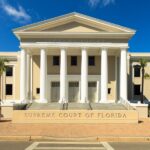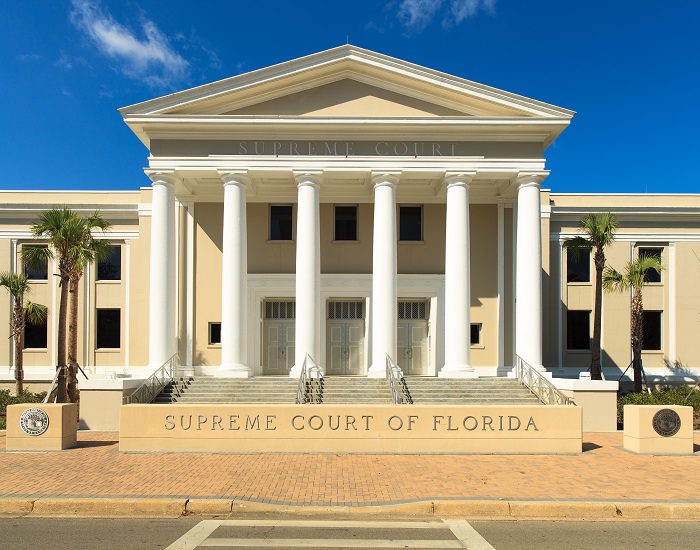 The U.S. Court of Appeals for the Eleventh Circuit recently held that a bank did not perfect its security interest in a business debtor’s assets because the two UCC-1 Financing Statements filed with the Florida Secured Transaction Registry that failed to correctly name the debtor were “seriously misleading” under Florida Statute Section 679.5061(2), as the Registry does not implement a “standard search logic” necessary to trigger the safe harbor exception set forth in Florida Statute Section 679.5061(3).
The U.S. Court of Appeals for the Eleventh Circuit recently held that a bank did not perfect its security interest in a business debtor’s assets because the two UCC-1 Financing Statements filed with the Florida Secured Transaction Registry that failed to correctly name the debtor were “seriously misleading” under Florida Statute Section 679.5061(2), as the Registry does not implement a “standard search logic” necessary to trigger the safe harbor exception set forth in Florida Statute Section 679.5061(3).
In so ruling, the Eleventh Circuit applied Florida law as opined by the Florida Supreme Court in response to certified questions.
A copy of the opinion in 1944 Beach Boulevard, LLC v. Live Oak Banking Company is available at: Link to Opinion.
A business and its affiliates filed voluntary petitions for relief under Chapter 11 of the United States Bankruptcy Code. The business and its affiliates were jointly and severally liable to a bank on two loans guaranteed by the U.S. Small Business Administration. These loans purported to be secured by a blanket lien on all of the business’s assets.
The bank, in an attempt to perfect its security interest in these assets, filed two UCC-1 Financing Statements with the Florida Secured Transaction Registry. These filing statements identified the business by using an abbreviation instead of the business’s legal name, as listed in the articles of organization filed with the Florida Secretary of State.
The business filed a complaint asserting that the bank’s financing statements were “seriously misleading” under Florida Statute § 679.5061(2) and therefore ineffective to perfect the bank’s security interest.
The parties eventually cross-moved for summary judgment, and the bankruptcy judge granted summary judgment for the bank, concluding that the bank’s financing statements fell under the “safe harbor” of Section 679.5061(3) because a search of the business’s correct legal name on the Registry’s website revealed that the financing statements were found on the page immediately following the initial page. Thus, the bankruptcy court held the bank’s financing statements were not seriously misleading and were effective to perfect the bank’s security interest in all of the business’s assets.
The trial court, sitting in an appellate capacity, affirmed the bankruptcy court’s order. The business then timely appealed to the Eleventh Circuit.
Florida Statute § 679.5061 concerns the effect of errors or omissions in financing statements. The statute provides, in relevant part:
(1) A financing statement substantially complying with the requirements of this part is effective, even if it has minor errors or omissions, unless the errors or omissions make the financing statement seriously misleading.
(2) Except as otherwise provided in subsection (3), a financing statement that fails sufficiently to provide the name of the debtor in accordance with s. 679.5031(1) is seriously misleading.
(3) If a search of the records of the filing office under the debtor’s correct name, using the filing office’s standard search logic, if any, would disclose a financing statement that fails sufficiently to provide the name of the debtor in accordance with s. 679.5031(1), the name provided does not make the financing statement seriously misleading.
Additionally, Section 679.5031(1) specifies how to correctly name a debtor that is a registered organization:
A financing statement sufficiently provides the name of the debtor . . . only if the financing statement provides the name that is stated to be the registered organization’s name on the public organic record most recently filed with or enacted by the registered organization’s jurisdiction of organization that purports to state, amend, or restate the registered organization’s name
The Eleventh Circuit explained that Section 679.5061(2) creates a zero-tolerance rule, under which a financing statement that fails to name the debtor as directed in Section 679.5031(1) is “seriously misleading.”
Additionally, the Court noted that Section 679.5061(3) creates a “safe harbor exception” to Subsection (2)’s zero-tolerance rule, providing that a financing statement with errors or omissions in naming a debtor will still be effective to perfect a security interest so long as “a search of the records of the filing office under the debtor’s correct name, using the filing office’s standard search logic, if any, would disclose [the] financing statement.” § 679.5061(3).
Because this case presented a novel issue of Florida law that divided bankruptcy courts within the Eleventh Circuit, and because the Eleventh Circuit faced substantial doubt as to how the Florida Supreme Court would resolve the split, the Eleventh Circuit certified three questions to the Florida Supreme Court.
The Florida Supreme Court, however, found dispositive a threshold question that was not expressly certified by the Eleventh Circuit: Is the filing office’s use of a “standard search logic” necessary to trigger the safe harbor protection of Section 679.5061(3)? After analyzing the language of Section 679.5061(3), the Florida Supreme Court concluded yes — i.e., the Florida filing office’s use of a “standard search logic” is necessary to trigger the safe harbor protection.
In answering its threshold question, the Florida Supreme Court adopted the definition of “standard search logic” accepted in the secured transactions industry, which requires the search to identify specific hits on the searched name, if any, and held that the search option offered by the Registry, which returned the entire index, was not a “standard search logic.” As a result, the Florida Supreme Court concluded that, because the Registry lacked a “standard search logic,” the search contemplated by Section 679.5061(3) was impossible, and filers with the Registry were left with the zero-tolerance rule of Section 679.5061(2).
Accordingly, any financing statement filed in the Registry that failed to correctly name the debtor, as required by Section 679.5031(1), was “seriously misleading” and therefore ineffective.
Thus, when the case returned to the Eleventh Circuit for disposition, the Eleventh Circuit held that the Florida Supreme Court’s answer to the threshold question it identified resolved the appeal. The Eleventh Circuit specifically concluded that the bank did not perfect its security interest in the business’s assets because the two UCC-1 Financing Statements filed with the Registry were “seriously misleading” under Section 679.5061(2), as the Registry did not implement a “standard search logic” necessary to trigger the safe harbor exception set forth in Section 679.5061(3).
Accordingly, the Eleventh Circuit reversed the trial court’s order affirming the bankruptcy court’s grant of the bank’s cross-motion for summary judgment and remanded for further proceedings.


